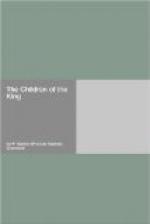In an instant Bastianello produced a decanter out of a bucket of snow and brought it aft with a glass. The Marchesa smiled.
“You do things very well, dearest friend,” she said, and moistened her lips in the cold liquid.
“Donna Beatrice has had more to do with providing for your comfort than I,” answered the Count.
The Marchesa smiled lazily, sipped about a teaspoonful from the glass and handed it to her maid.
“Drink, Teresina,” she said. “It will refresh you.”
The girl drank eagerly.
“You see,” said the Marchesa, “I can think of the comfort of others as well as of my own.”
San Miniato smiled politely and Beatrice laughed. Her laughter hurt the silent sailor perched behind her, as though a glass had been broken in his face. How could she be so gay when his heart was beating so hard for her? He drew his breath sharply and looked out to sea, as many a heart-broken man has looked across that fair water since woman first learned that men’s hearts could break.
It was a wonderful afternoon. The sun was already low, rolling down to his western bath behind Capo Miseno, northernmost of all his daily plunges in the year; and as he sank, the colours he had painted on the hills at dawn returned behind him, richer and deeper and rarer for the heat he had given them all day. There, like a mass of fruit and flowers in a red gold bowl, Sorrento lay in the basin of the surrounding mountains, all gilded above and full of rich shadows below. Over all, the great Santangelo raised his misty head against the pale green eastern sky, gazing down at the life below, at the living land and the living sea, and remembering, perhaps, the silent days before life was, or looking forward to the night to come in which there will be no life left any more. For who shall tell me that the earth herself may not be a living, thinking, feeling being, on whose not unkindly bosom we wear out our little lives, but whose high loves are with the stars, beyond our sight, and her voice too deep and musical for ears used to our shrill human speech? Who shall say surely that she is not conscious of our presence, of some of our doings when we tear her breast and lay burdens upon her neck and plough up her fair skin with our hideous works, or when we touch her kindly and love her, and plant sweet flowers in soft places? Who shall know and teach us that the summer breeze is not her breath, the storm the sobbing of her passion, the rain her woman’s tears—that she is not alive, loving and suffering, as we all have been, are, or would be, but greater than we as the star she loves somewhere is greater and stronger than herself? And we live upon her, and feed on her and all die and are taken back into her whence we came, wondering much of the truth that is hidden, learning perhaps at last the great secret she keeps so well. Her life, too, will end some day, her last blossom will have bloomed alone, her last tears will have fallen upon her own bosom, her last sob will have rent the air, and the beautiful earth will be dead for ever, borne on in the sweep of the race that will never end, borne along yet a few ages, till her sweet body turns to star-dust in the great emptiness of a night without morning.




